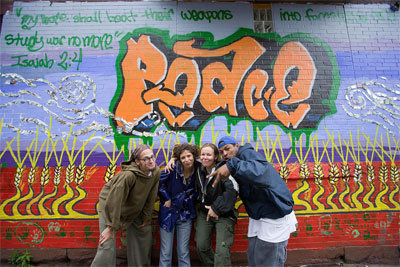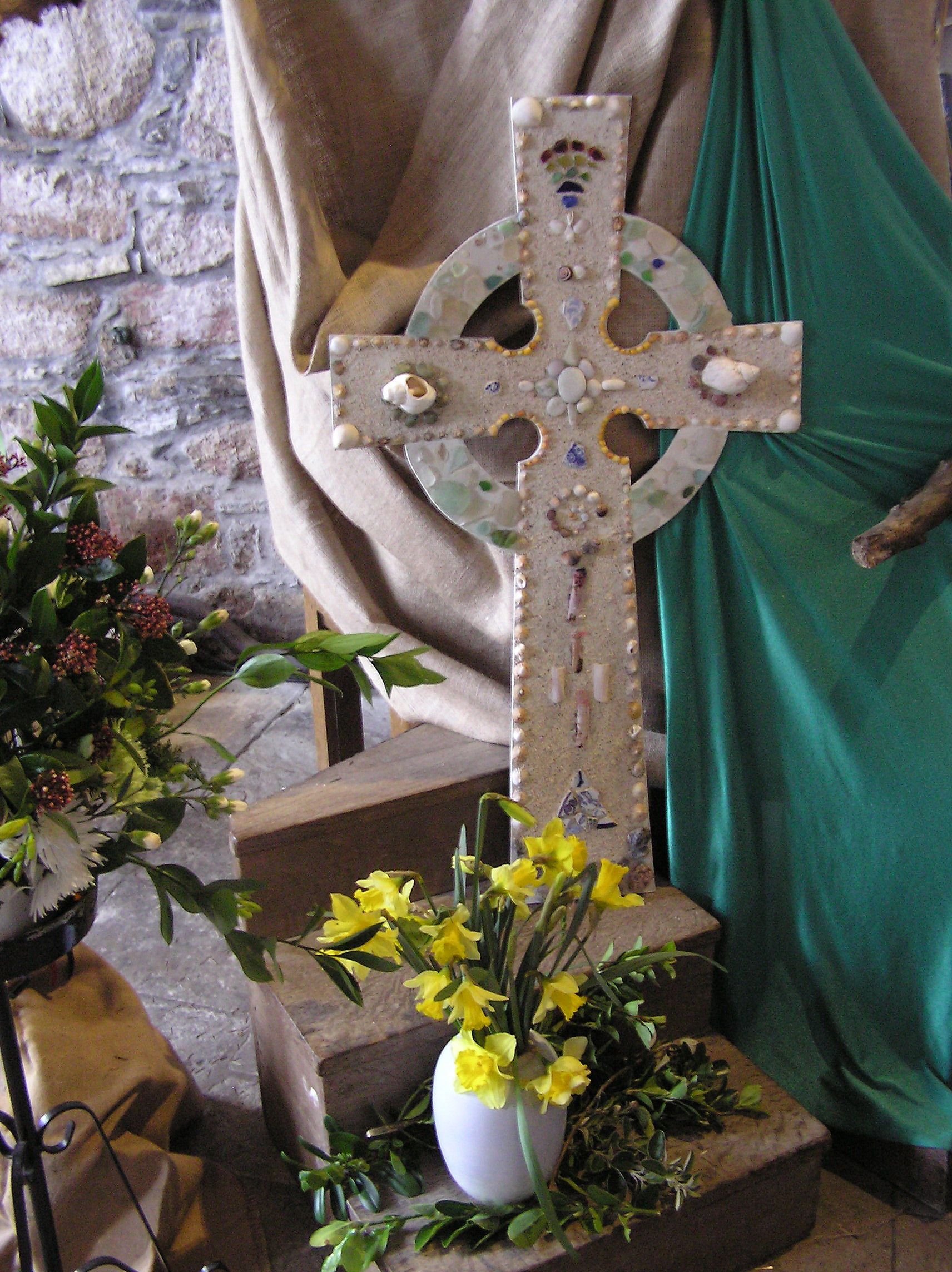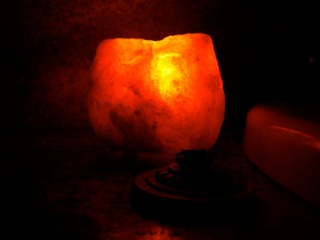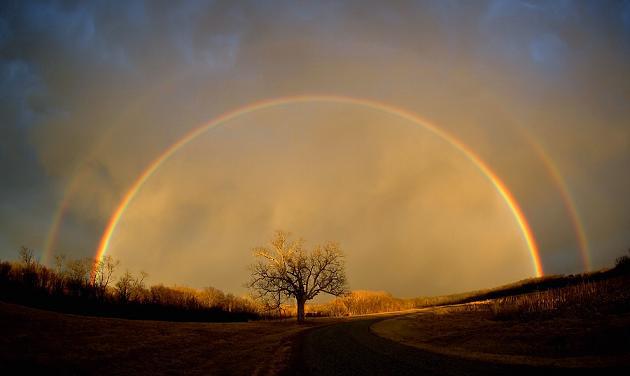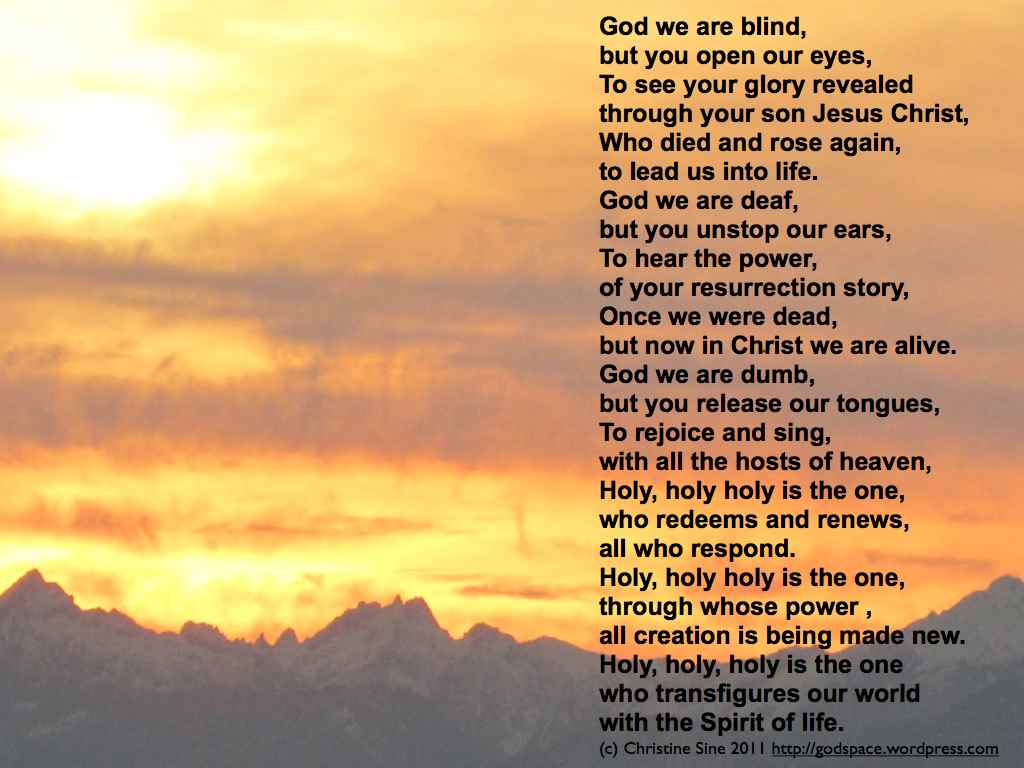The focus for my next few weeks will be “Practicing resurrection”. I am starting each morning by asking myself the question: “How do I plan to practice resurrection today?”
This morning I found my thoughts focusing on my images of God’s new world – what I call God’s resurrection created world. What do I think this will look like? Unless I have a clear vision of this world there is no way that I can live into it.
Usually I confine this kind of imagining to Sundays. God’s rest on the seventh day was a rest of satisfaction, when he looked around at all that had been accomplished in the previous six days and said “It is good.” That is the kind of Sabbath rest that we are meant to live into. What I try to do on Sundays (and some Sundays are more successful than others) is relax and rest in the presence of God and God’s shalom world.
I was really inspired some years ago by the Jewish philosopher Abraham Heschel who said that the Jews regarded Sabbath as a glimpse into the eternal world. I realized that my Sunday practices looked nothing like what I hope God’s eternal world will look like. So I started to try and realign my Sunday activities to reflect more of what my vision of God’s future eternal, shalom filled world will look like.
Easter tends to be a more successful season for this focus in my life. Thinking of the resurrection makes it easy to reflect on my images of God’s eternal world – A world in which the language is love and the culture centres on mutuality and generosity. A country where there is no more crying or oppression or pain, a place where justice will come for the poor and the sick will be healed, a place where God’s creation is restored and there is abundance and prosperity for all.
This is a world with very different values and culture than ours. In fact I think that many of us will suffer severe culture shock when we enter this world because we have spent so little of our time and energy living in this culture here.
So this morning I thought about where I have caught glimpses of God’s shalom world in this past week. I got quite excited as I thought about the people I have connected to and some of the friendships I am developing. I was encouraged as I thought about my friends in Parish Collective, The Overflow Project and Mercy Ships and the wonderful work they all do in reaching out to their neighbourhoods and the marginalized around the world. I also experienced a deep sense of satisfaction as I thought about the day Tom and I spent in the garden on Saturday planting the spring garden.
I went to church Easter Sunday very much aware of God’s presence with me which of course made it much easier to enter into the spirit of Easter in the liturgy and particularly in communion. Sunday afternoon we celebrated Easter with a richly multicultural community of friends – a glimpse into the diversity of God’s international family.
I thought too about the things I have done that are not representative of God’s resurrection created world – the times I got irritable with Tom, times I resented sharing the bounty God has provided us with, times I turned away from those who are hurting and in need because I wanted to put my own needs ahead of theirs. Because of Christ’s resurrection we can live in a way that is very different from the culture around us but we need to keep reminding ourselves of what that culture looks like and what we need to do to live into it.
Sunday for me, is always a day to realign my life and all my activities not just to the celebration of God’s shalom future but to how God can use our lives to bring glimpses of that future into our world. Obviously Easter Sunday and this season after Easter, is a very special opportunity to do this.
It is a season for celebrating our restored relationship to God, our reconciliation to our neighbours, our renewed responsibility to steward God’s creation. So why not jump start your celebration of God’s resurrection culture, by spending time reflecting on God’s eternal shalom world, this resurrection created life that God expects us to live into? Get a vision for how your life and your activities could make a difference in the lives of others and in God’s world. We cannot bring God’s eternal world into being by our own efforts but we are meant to live as citizens of that new world and live with the values and customs of that new world at the centre of our lives.
Easter Sunday has come and gone and its time to practice resurrection living! As I mentioned in my post Practicing Resurrection yesterday, Easter is not just a day it is a season, in fact it is the framework for the rest of our lives. Over the next few weeks I plan to share a number of stories of creative ministries and initiatives that do just that. Today’s post is written by Brian “Wolt” Wolters, director of The Overflow Project. It was first published as Being Radical, Good Friday on the MSA website as part of a series on the Overflow Project. The MSA team are all joining the initiative this year and we hope you will too.
——————————————————————————————————-
Over the past several weeks I have found myself coming up with excuses to drive to work instead of ride my bike. Even before I get in my truck I tell myself, “Oh, one more day of driving and then I’ll start riding my bike,” or even on a sunny day I’ll say “Oh, it may rain today, so I’ll just drive.”
Why is it that we often have good intentions of doing something we think is best, but then opt for something easier or more convenient? Why do we form habits as human beings that prevent us from being radical?
Many books explore these questions. Some prescribe easy “steps” or even “recipes” for breaking out of patterns and molds that develop over time. On the flip side, other materials suggest creating new habits for life change like setting aside time for prayer and exercise daily.
Insert Good Friday. Jesus’s death on a cross is radical I think. He does not conform to culture or take the easy, most comfortable option. He also does not say oh today, I’m going to start “effective habits.” He even goes against his own desire and chooses to die! If you want a vivid reminder the horror of his death, pick up the Mel Gibson film, The Passion of Christ.
The reminder of Jesus death on Good Friday inspires me to be more in tune with God’s voice for my life – instead of my own desires – and explore being radical by forming new habits and breaking old ones. I pray I am who God made me to be and that I my eyes open to see my comfort zones.
I shared these thoughts about Easter with MSA last year, and am just as excited about The Overflow Project’s initiative this year. The opportunity is great: to join with others in a unified effort to live with a little less and be able to give a little bit more, following the mold of Jesus death on the cross and celebrating on Easter his resurrection.
Perhaps today is a day to break a habit or start a new one. Jesus leads us in His way and with His death.
An opportunity to celebrate his resurrection on Easter exists.
Join in a challenge for the 50 days of the Easter season.
This is the fourth post in a Friday series about The Overflow Project that was published on the MSA blog, leading up to the 50 Day Challenge starting on Easter.
Periodically during the 50 days, various Challenge participants with share how they are taking the challenge and what they’re learning.
If you decide to take the challenge, please register on their page and share your story!
The Overflow Project is an initiative committed to a new way of living, a way of living that breaks down the walls that divide rich and poor. Using a 50-Day Challenge, The Overflow Project helps individuals, groups and churches simplify their lives in order to give generously. Donated funds provide clean drinking water – a vital resource for community and economic development.
Its Easter Sunday, for many of us the culmination of our faith, the day for which all of us have waited, hoped and longed for. For many of us this seems like the end of the story, at least that is what you would think by the way we act during the rest of the year. Easter Sunday comes, we give our shouts of Alleluia, sing a few songs of praise, and then we pretty much go about life as usual. Tomorrow we will wake up, drink a cup of coffee or tea, and as I said in a previous Easter post What Have We Done with Jesus, go back to our pre Christ encounter jobs totally unchanged by all that Jesus has said and done.
Easter Sunday is not an end but a beginning. And it isn’t just a single day, it is a whole season that extends until Pentecost. How could we possibly celebrate the wonder of God’s new world which was ushered in by the resurrection, in a single day? And how can we possibly confine the practice of this incredible event to a short church service.
This is the season to practice resurrection, the time to go out and not just shout about the new life we have in Christ but to live it. Jesus resurrection transformed his disciples. They left homes and families and jobs to live radically different lives. They sold their property and shared it with others. They looked after the sick and cared for the marginalized, and guess what, this small band of disciples became a world wide movement that still transforms lives today. What difference has it made in our lives?
In my study guide Celebrating the Joy of Easter, I ask
What kind of God do we want to incarnate to our world? Is it a God of love and compassion who leaves ninety-nine sheep in order to rescue one that has gone astray, or one who constantly accuses those who do not follow God’s ways? Is it a God who gets his hands dirty by entering, in a very personal and human way, into the pain and suffering of our world, or one who inflicts pain and anguish as punishment for our sins? Is it a God who celebrates life with enthusiasm by turning water into wine at a wedding, or one who strips us of our joy by placing heavy burdens on our shoulders? Is it a God who hears our cries and brings justice for the poor and oppressed, or one who stands aloof and indifferent to our pain?
Easter is the season to show others what kind of world we believe Jesus resurrection ushered into our broken world. It is a season to get out and practice hospitality, compassion, love, healing, generosity and care for creation. It is a season to show by our words and actions that we really do believe Jesus is indeed alive and is transforming our world… through us!
It is Holy Saturday, that day between death and resurrection when most of us pause to draw breath. What did not occur to me until I read these words Even resurrection pauses for Sabbath rest, in the Episcopal Relief and Development Lenten guide this morning, that today, for the Jews is indeed the sabbath day. This full day of Jesus time in the grave is the day into which all their hope and longing for the future is poured. A day to look forward with anticipation to the day when God does indeed make all things news.
The last words that Jesus cried before his death are It is finished. The work that God has sent me to do is done. It is indeed time to pause for rest, but what is God’s sabbath rest all about? Sabbath rest is not a rest of exhaustion, a pause before we get going with the next busy thing. Sabbath rest is a rest of fulfillment, of satisfaction for a job well done and as I sit here this morning I can well imagine God resting in the satisfaction of the amazing job that Jesus had just completed.
For the Jews Sabbath also carries with it a sense of longing and promise. It is the culmination of their week, that day on which they hoped to glimpse God’s eternal world and on this Sabbath rest 2,000 years ago they did glimpse it, though they did not know it. As Jesus entered Hades and released those who had died, the first signs of God’s resurrection world emerged in expectation of the fullness of God coming into the world on Easter morning.
At lunch time today Tom and I attended a Good Friday service at our local church. The service included the reading of the story of Jesus’ arrest and crucifixion from the gospel of John. What particularly struck me was the account of Jesus burial which tells us that Jesus body was laid in a new tomb in a nearby garden. It is planting time here in Seattle and so, not surprisingly, the imagery that came to my mind was of Jesus, like a seed of wheat, being planted in a garden, buried in the earth to await the birth of a new creation.
Far fetched you might think? Maybe not. Some theologians think that the whole theme of the Gospel of John is that of new creation. Most of the book of John (chapters 12-20) takes place during one week in the life of Christ. John concentrates on themes. One theme is that Christ will redeem all of Creation (not just souls) through Re-Creation. In many ways Jesus death was like the planting of a seed (Unless a seed is planted in the soil and dies it remains alone, but its death will produce many new seeds, a plentiful harvest of new lives (Jn 12:24). And then in John 20:15 we read: “she thought he was the gardener” Why did it matter that Mary Magdalene thought that Jesus was the gardener?
The gospel of John begins with the words “In the beginning”. This immediately harkens us to the book of Genesis which opens with the same words. John then lays out a series of events in the life of Christ that mirror the Seven Days of Creation. Read more
In the beginning God planted a garden – the Garden of Eden (Gen 3:8). In the beginning of the new creation brought into being by the resurrection of Christ God now in the form of the risen Christ, is once more seen as a gardener. The hope and promise of these words which we so often skim over is incredible. As we read in 2 Corinthians 5:17
“Therefore if anyone is in Christ he is a new creation, the old has passed away, behold, the new has come.”
So as we mourn the death of Christ today let us consider the hope that the planting of a seed gives us. It is but a dim mirror of the hope that resides in the Christ whose death we remember today and whose resurrection carries with us the promise of many lives renewed, restored and bearing fruit.
Song writer and musician Steve Bell has several beautiful posts for this holy weekend that I thought you might like to be aware of
This one for Good Friday features the song Gone is the Light
Gone is the Light
Music and lyric by Gord Johnson
appears on Steve Bell’s Devotion album (see below)
Into the darkness we must go
Gone, gone is the light
Into the darkness we must go
Gone, gone is the light
Jesus remember me
When you enter your Kingdom
Jesus remember me
When your kingdom comes
Father forgive them
They know not what they do
Father forgive them
They know not what they do
Into the darkness we must go
Gone, gone is the light
Into the darkness we must go
Gone gone is the light
And this one for Easter Sunday features another beautiful song Was It a Morning Like This.
Was it a Morning Like This | Jim Croegaert
Was it a morning like this
When the sun still hid from Jerusalem
And Mary rose from her bed
To tend the Lord she thought was dead
Was it a morning like this
When Mary walked down from Jerusalem
And two angels stood at the tomb
Bearers of news she would hear soon
chorus:
Did the grass sing
Did the earth rejoice to feel you again
Over and over like a trumpet underground
Did the earth seem to pound He is risen!
Over and over like in a never ending round
He is risen! Alleluia!
Was it a morning like this
When Peter and John ran from Jerusalem
And as they raced for the tomb
Beneath their feet was there a tune
As an Amazon Associate, I receive a small amount for purchases made through appropriate links.
Thank you for supporting Godspace in this way.
When referencing or quoting Godspace Light, please be sure to include the Author (Christine Sine unless otherwise noted), the Title of the article or resource, the Source link where appropriate, and ©Godspacelight.com. Thank you!

